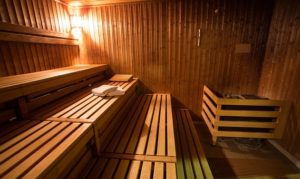Socratic Questioning – This is How to Learn Like Socrates
About 6 months ago I was listening to a podcast that discussed the health benefits of using the sauna on a regular basis. Being someone who is always trying to take his health and fitness to the next level, I decided to give it a shot. Luckily my gym has a sauna – so, I went a few times and it was fine, but to be honest, I didn’t really know what the hell I was doing.
Around the same time, I read an article about Socratic questioning – a teaching method named after the Greek philosopher Socrates. Instead of lecturing and giving students information, the teacher engages in a shared dialogue and asks questions to draw the answers out of them. The idea is to reason your way to a solution or reason your way to understanding something by being asked a series of questions.

Could I Use Socratic Questioning to Learn More About the Sauna?
Socratic questioning as I said is typically used in the classroom as its power lies in the back and forth dialogue between teacher and student. My question to myself was “Can I use it as a solitary exercise to ask myself questions that others would normally ask to learn more about a certain topic, in this case, the sauna?”. That is the subject of today’s blog post, using Socratic questioning to understand something more in-depth.
Before we get to how I used it, let’s understand Socratic questioning a bit better.
You Can Think of it in Terms of Push vs. Pull
Instead of pushing information out to a student, the teacher asks a question, then answers the student’s questions with questions to pull it out of them, instead of telling them the answers. This makes the students explore the subject in much more detail and stimulates their ability to engage in critical thinking. Socrates thought that “the disciplined practice of thoughtful questioning enables the scholar/student to examine ideas and be able to determine the validity of those ideas” 1
Why Is It Such a Powerful Method?
The main reason it is such a powerful method is that it forces you to really learn and gauge your understanding of a subject. By using systematic, disciplined, and structured questions it forces you to go deeper into a subject than you normally would. It also forces you to question your own logic and test assumptions to find inconsistencies or flaws.
How Does it Work?
In academic settings, the teacher starts out with a question or a subject that the students need to learn about. Then the teacher leads a discussion by following up on the student’s answers or questions with questions from the following 6 types of Socratic questions:
(1) Questions that clarify the concept
These questions help you clarify the concept in general. Some examples of clarifying questions are:
 What do I know about this already?
What do I know about this already?
 What exactly does it mean?
What exactly does it mean?
 Is there another way it can be phrased?
Is there another way it can be phrased?
 What is included?
What is included?
 What is an example of it?
What is an example of it?
(2) Questions that challenge or probe assumptions
These are questions that help you challenge or probe the assumptions of the concept and look at what you are presupposing as well as your unquestioned beliefs. Some examples of questions that challenge or probe assumptions are:
 What could I assume instead?
What could I assume instead?
 How could I disprove or verify this assumption?
How could I disprove or verify this assumption?
 What else could I assume?
What else could I assume?
 How did I come up with this assumption?
How did I come up with this assumption?
 What would happen if?
What would happen if?
(3) Questions that examine evidence, rationale or reasons
These types of questions explore the reason for your thoughts and the evidence. Have you really thought things through or do you have a weak understanding? Some examples of these types of questions are:
 What is causing such and such to happen?
What is causing such and such to happen?
 Is there something it is analogous to?
Is there something it is analogous to?
 How do I know this and how can I be sure of this?
How do I know this and how can I be sure of this?
 Are the reasons I am doing this good enough?
Are the reasons I am doing this good enough?
 What evidence is there to support this? Is the source an authority on it?
What evidence is there to support this? Is the source an authority on it?
(4) Questions regarding viewpoints and perspectives
This attacks the current position or perspective you are taking by looking at other valid viewpoints. Some examples of questions relating to viewpoints and perspectives are:
 What is an alternative I could explore?
What is an alternative I could explore?
 How else could I look at this?
How else could I look at this?
 Why is this better than the alternative?
Why is this better than the alternative?
 What are the strengths and weaknesses of this?
What are the strengths and weaknesses of this?
 How is it similar or different from an alternative?
How is it similar or different from an alternative?
(5) Questions that explore implications and consequences
These questions look at the implications and consequences of our thoughts, whether they make sense and whether the consequences are desired. Some examples of questions are:
 What are the implications and consequences of this?
What are the implications and consequences of this?
 How does it affect whatever?
How does it affect whatever?
 Why is it important?
Why is it important?
 How could it be used to?
How could it be used to?
 How does it fit with…?
How does it fit with…?
(6) Questions about the question
This helps you think through why you are asking certain questions, as well as the implications of asking certain questions. Some examples of these questions are:
 Why did I ask this question?
Why did I ask this question?
 What does the question mean?
What does the question mean?
 Does this question make sense?
Does this question make sense?
 What is the point of this question?
What is the point of this question?
 What other questions could I ask?
What other questions could I ask?
Now that we have reviewed the types of questions used in Socratic questioning to explore a subject, let’s look at…
How I Used it To Improve my Sauna Experience
Now that we have seen how Socratic questions work in a classroom environment it is time to experiment with using them in a self-improvement context.
As I said above, I did not use Socratic questioning to improve my sauna experience right away, which I probably should have. I did a few sessions first before I decided to be more systematic and disciplined about it.
The First Couple Times
I used the sauna I would do my workout, go in the sauna for 10 minutes, come out with a red face looking like a tomato, feel nauseous and like I was going to pass out, have to sit down for a bit (all sweaty and gross) and then drive home and take my monthly shower (don’t judge me!). There had to be a better way…

Cue Socratic Questioning!
So, I decided to use Socratic questioning to see if I could improve my sauna experience.
The fact of the matter is this – the catalyst for good thinking is asking good questions. So, for me to improve my sauna experience, I would need to ask good questions, which would lead to good answers, and further questions.
Unlike the classroom where the teacher engages students in a back and forth of asking questions, I simply used the types of Socratic questions as a framework to improve my ability to learn about a subject, in this case – using the sauna.
I won’t go through all of my questions and answers in the interest of time, but will cover a few in each type to give you an idea of how I used it.
A QUICK DISCLAIMER: Please do not try anything discussed in this post related to using the sauna without first consulting a physician. The point of the post is to explain Socratic questioning, not how to use a sauna.
So, after doing some basic research to familiarize myself with sauna basics, I went through each of the 6 types of Socratic questions to learn more about how to improve my sauna experience.
(1) Questions that clarify the concept:
What do I already know about the concept of using the sauna?
I knew that it is a small room that cleans and refreshes the body using wet or dry heat sessions. Which led me to ask, are there different types? I found that are dry and wet saunas. Wet saunas aka steam rooms generate moist heat between 110-120 degrees, while a dry sauna generates dry heat between 160-200 degrees. Since my gym only had a dry sauna, I would focus on that.
I knew that saunas were good for stress reduction, but what else are they good for?
After doing more reading, I found that saunas can help improve circulation and oxygenation as your blood vessels dilate which increases blood flow and improves circulation. I also found that they can help reduce blood pressure, heart disease and increase growth hormone levels. Other benefits can be: enhanced physical endurance, increased release of growth hormone, and positive effects on the brain.

(2) Questions that challenge or probe assumptions:
There is a sign that says don’t stay longer than 10 minutes, does that mean 10 minutes the optimal time?
After doing research, I found 20-25 minutes is the ideal time. However, you should start at 5 to 10 minutes and gradually increase your time. I’m assuming the 10 minutes on the sign is posted for legal reasons.
I’m assuming the sauna in my gym is hot enough, is it?
Bad assumption! There are 2 saunas in my gym with only one being open at a time, they rotate them. I found that one was consistently the right temperature (roughly 180 degrees F) while one didn’t ever get hot enough. A quick email to the gym manager and the problem was solved.
(3) Questions that examine evidence, rationale or reasons
What scientific research has been done?
A famous study was done in Finland, where using saunas is prevalent showed those who use a sauna may have a lower risk of dying from heart disease. And although more research needs to be done, it also showed a decrease in sudden cardiac arrest of 22% for those who did it 3x per week and 63% for those who did it every day.

(4) Questions about viewpoints and perspectives
Are there alternatives I could explore? What about the hot tub?
While I did find there are many similar health benefits for hot tubs, I am going to stick with the sauna as there are more benefits backed by research, at least from what I found.
(5) Questions that explore implications and consequences
Are there risks? What adverse things could happen? Is there an ideal time? How often should I go? What is causing me to feel lightheaded and what is there anything I can do to prevent it?
One of the risks of exposing your body to heat is dehydration due to fluid loss while sweating. By making sure I am hydrated before entering the sauna and bringing water in with me, I have eliminated that problem. I also have a 5-minute cold shower right after to bring my body temperature back down which makes for a more comfortable and less sweaty ride home.
(6) Questions about the question
What other questions could I ask? What about sauna etiquette?
I have seen and heard some crazy stuff in the sauna – from people discussing their sex lives (TMI!), to people with questionable personal hygiene (no need to get into details), to questionable attire (seeing things that I would rather not have seen!), to people doing full on workouts in the sauna.
If you are one of these people, do me and your fellow sauna goers a favor and Google ‘sauna etiquette’ and please practice it!
So, that’s it, that is how I used Socratic questioning to improve my sauna experience. And it is a process that never stops and something that I will continue to use when I want to learn more about something!
Until next time, sauna with class, keep asking those Socratic questions and as always…PYMFP!
–Rick
Lessons I Learned Using the Socratic Method – Use It or Lose It
How to use Socratic questioning:
 When you want to learn more about something, use the framework of the 6 types of Socratic questions to make sure you cover the topic from as many angles as possible.
When you want to learn more about something, use the framework of the 6 types of Socratic questions to make sure you cover the topic from as many angles as possible.
Other tips:
 Use it before you do something, unlike me!
Use it before you do something, unlike me!
 But also keep using it, it is an iterative process. As you learn things, question them and go down a different path regarding the stuff you have learned.
But also keep using it, it is an iterative process. As you learn things, question them and go down a different path regarding the stuff you have learned.
 You don’t have to use all the sub-questions.
You don’t have to use all the sub-questions.
 Come up with your own questions.
Come up with your own questions.
 Ask the questions in different order.
Ask the questions in different order.
 Do what makes sense.
Do what makes sense.
 Take time to practice and hone your questioning.
Take time to practice and hone your questioning.
 Probe and explore the topic until you have as complete an understanding as you need.
Probe and explore the topic until you have as complete an understanding as you need.
When to Use It
There are many areas you can use Socratic questioning:
 When arguing or debating with someone – asking questions is very powerful.
When arguing or debating with someone – asking questions is very powerful.
 If you are trying to teach someone something. For example, teaching your child a lesson, instead of giving them the answer, ask them questions to get them thinking more.
If you are trying to teach someone something. For example, teaching your child a lesson, instead of giving them the answer, ask them questions to get them thinking more.
 When trying to come up with a solution in a group setting. Ask probing questions to get people thinking differently.
When trying to come up with a solution in a group setting. Ask probing questions to get people thinking differently.
What Do You Think?
 Have you ever used Socratic questioning in your life? What was your experience with it? And if not, can you see yourself using it? If so, how and where? Please share in the comments section below!
Have you ever used Socratic questioning in your life? What was your experience with it? And if not, can you see yourself using it? If so, how and where? Please share in the comments section below!
If you enjoyed this post, it would mean the world to us if you shared it with people you care about via any of the social media platforms below!
Popular Previous Posts:
This is Why You Need to Be Careful Using Others Experiences
How to Remove These 7 Wastes From Your Life
3 of the Best Podcast Episodes I Have Ever Heard!
You’re Fired! 10 Things This Mofo Learned By Getting Fired
This is How to Make a Great First Impression Every Time!
References
1 “What is Socratic Questioning”. Starting Point – Teaching Entry Level Geoscience. Carleton College. Retrieved March 31, 2018.
https://en.wikipedia.org/wiki/Socratic_questioning
http://www.umich.edu/~elements/fogler&gurmen/html/probsolv/strategy/cthinking.htm
W. Paul, L. Elder: The Thinkers Guide to The Art of Socratic Questioning, 2007
https://tilt.colostate.edu/teachingResources/tips/tip.cfm?tipid=53
https://stanford.box.com/shared/static/phao9711s61u5liv3e22.pdf
https://tim.blog/2014/04/10/saunas-hyperthermic-conditioning-2/

Love the tomato head! Too cute . Lol Enjoyed the article. You can use that questioning approach to solve problems in daily situations .Thanks Rick.